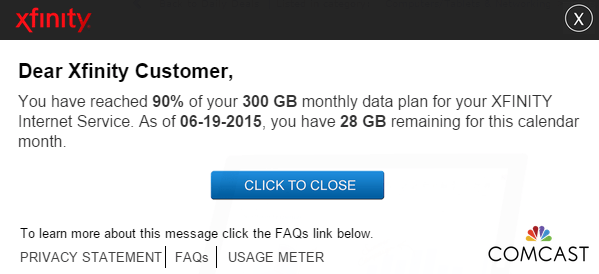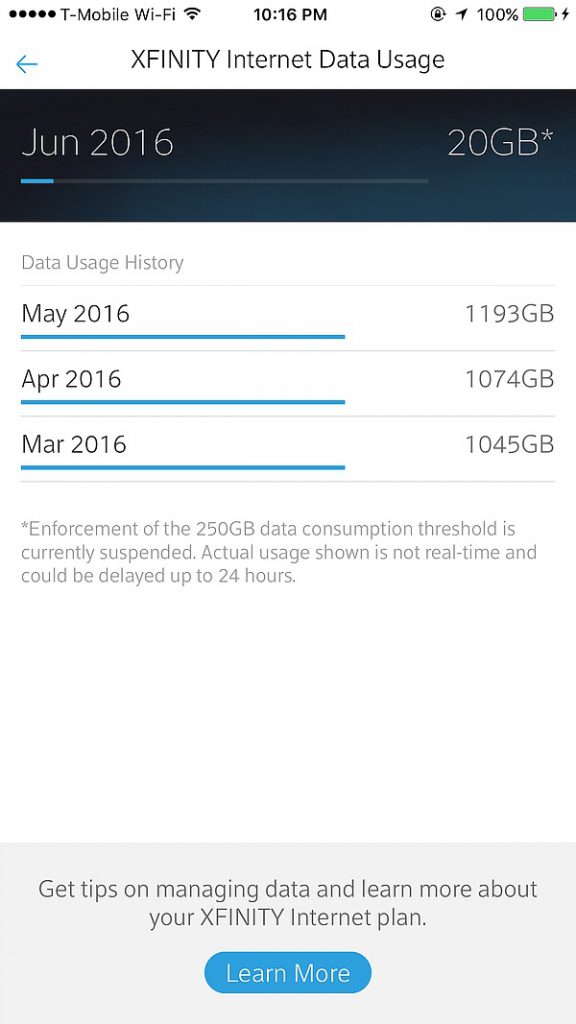Expired Data Usage Plans
Important Note: These data usage plans, which Comcast previously had in place, expired on June 1, 2016, and have been replaced with the new plans described above
In the markets of Huntsville, Mobile and Tuscaloosa, Alabama; Little Rock, Arkansas; Fort Lauderdale,the Keys, and Miami, Florida; Atlanta, Augusta and Savannah, Georgia; Houma, LaPlace, andShreveport, Louisiana; Jackson and Tupelo, Mississippi; Chattanooga, Greeneville, Johnson City/Gray,Knoxville, Memphis and Nashville, Tennessee; Charleston, South Carolina; and Galax, Virginia, we have increased our monthly data usage plan for all XFINITY Internet tiers to 300 GB per month and will offer additional gigabytes in increments/blocks ($10 per 50 GB). In this trial, you can also choose to enroll in an Unlimited Data Option for an additional recurring flat fee (e.g., $30-$35 per month). Under this option, the 300 GB data usage plan will not be enforced on your account. If you subscribe to Economy Plus or Performance Starter XFINITY Internet, you can instead choose to enroll in the Flexible Data Option to receive a $5 credit on your monthly bill if you reduce your data usage plan to 5 GB. If you choose this option and use 6 GB of data or more in any given month, you will not receive the $5 credit and will be charged an additional $1 for each gigabyte of data used over the 5 GB included in the Flexible Data Option.
In the markets of Central Kentucky and Maine, we have increased our data usage plan for XFINITY Internet tiers to 300 GB per month, offering additional gigabytes in increments/blocks ($10 per 50 GB). In this trial, XFINITY Internet Economy Plus customers can instead choose to enroll in the Flexible Data Option to receive a $5 credit on their monthly bill if they reduce their data usage plan to 5 GB. If you choose this option and use 6 GB of data or more in any given month, you will not receive the $5 credit and will be charged an additional $1 for each gigabyte of data used over the 5 GB included in the Flexible Data Option. Currently, the Unlimited Data Option is not available in these markets.
In the Tucson, Arizona, market, we have increased our monthly data usage plan for Economy Plus through Performance XFINITY Internet tiers to 300 GB. Those customers subscribed to the Performance Pro and Blast! Internet tiers receive 350 GB in their data usage plan; Blast! Pro customers receive 450 GB in their data usage plan; and Extreme customers receive 600 GB in their data usage plan. As in our other trial market areas, we offer additional gigabytes in increments/blocks of 50 GB for $10 each in the event the customer exceeds their included data amount. Currently, the Unlimited Data Option and the Flexible Data Option are not available in this market.
In Fresno, California, Economy Plus customers have the option of enrolling in the Flexible Data Option.


 Subscribe
Subscribe Comcast
Comcast  “Got the email this week we get to be part of this data cap ‘trial,'” shared another customer. “How lucky are we? And what do we get for being part of this trial? Absolutely nothing! And can we opt out of this trial? Heck no!”
“Got the email this week we get to be part of this data cap ‘trial,'” shared another customer. “How lucky are we? And what do we get for being part of this trial? Absolutely nothing! And can we opt out of this trial? Heck no!” An AT&T executive casually told an audience attending the Wells Fargo 2016 Convergence & Connectivity Symposium that a significant part of
An AT&T executive casually told an audience attending the Wells Fargo 2016 Convergence & Connectivity Symposium that a significant part of 

 You: I also learned that you have internet data cap?
You: I also learned that you have internet data cap? After four years of a gradually expanding “beta test” no customer wanted to be part of, Comcast’s never-ending data cap trial has increased data allowances for the first time since 2012.
After four years of a gradually expanding “beta test” no customer wanted to be part of, Comcast’s never-ending data cap trial has increased data allowances for the first time since 2012. Comcast customers in data cap trial areas tell Stop the Cap! their Comcast usage meter now reflects the new 1,024GB allowance Comcast
Comcast customers in data cap trial areas tell Stop the Cap! their Comcast usage meter now reflects the new 1,024GB allowance Comcast 

 Dear Members,
Dear Members,

